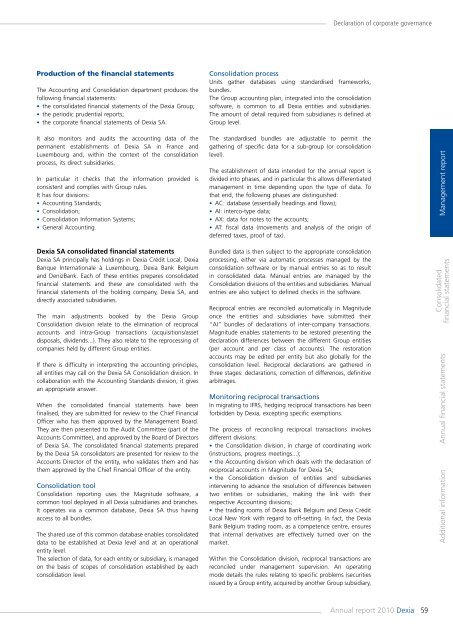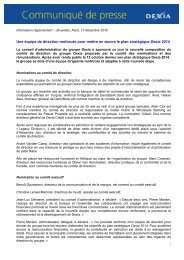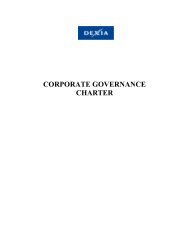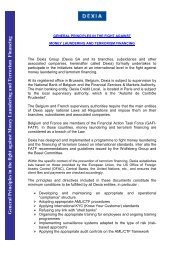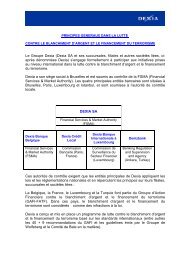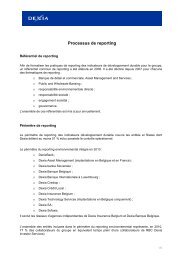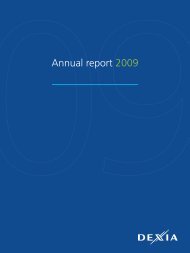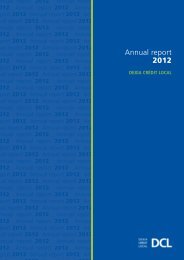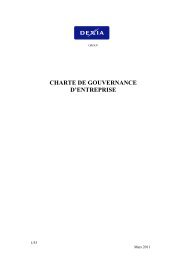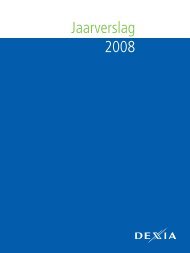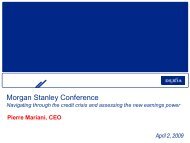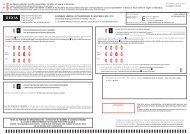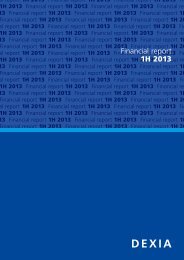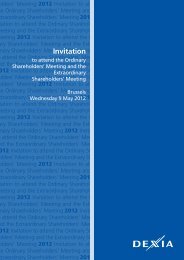Annual report 2010 - Dexia.com
Annual report 2010 - Dexia.com
Annual report 2010 - Dexia.com
- No tags were found...
Create successful ePaper yourself
Turn your PDF publications into a flip-book with our unique Google optimized e-Paper software.
Declaration of corporate governanceProduction of the financial statementsThe Accounting and Consolidation department produces thefollowing financial statements:• the consolidated financial statements of the <strong>Dexia</strong> Group;• the periodic prudential <strong>report</strong>s;• the corporate financial statements of <strong>Dexia</strong> SA.Consolidation processUnits gather databases using standardised frameworks,bundles.The Group accounting plan, integrated into the consolidationsoftware, is <strong>com</strong>mon to all <strong>Dexia</strong> entities and subsidiaries.The amount of detail required from subsidiaries is defined atGroup level.It also monitors and audits the accounting data of thepermanent establishments of <strong>Dexia</strong> SA in France andLuxembourg and, within the context of the consolidationprocess, its direct subsidiaries.In particular it checks that the information provided isconsistent and <strong>com</strong>plies with Group rules.It has four divisions:• Accounting Standards;• Consolidation;• Consolidation Information Systems;• General Accounting.<strong>Dexia</strong> SA consolidated financial statements<strong>Dexia</strong> SA principally has holdings in <strong>Dexia</strong> Crédit Local, <strong>Dexia</strong>Banque Internationale à Luxembourg, <strong>Dexia</strong> Bank Belgiumand DenizBank. Each of these entities prepares consolidatedfinancial statements and these are consolidated with thefinancial statements of the holding <strong>com</strong>pany, <strong>Dexia</strong> SA, anddirectly associated subsidiaries.The main adjustments booked by the <strong>Dexia</strong> GroupConsolidation division relate to the elimination of reciprocalaccounts and intra-Group transactions (acquisitions/assetdisposals, dividends...). They also relate to the reprocessing of<strong>com</strong>panies held by different Group entities.If there is difficulty in interpreting the accounting principles,all entities may call on the <strong>Dexia</strong> SA Consolidation division. Incollaboration with the Accounting Standards division, it givesan appropriate answer.When the consolidated financial statements have beenfinalised, they are submitted for review to the Chief FinancialOfficer who has them approved by the Management Board.They are then presented to the Audit Committee (part of theAccounts Committee), and approved by the Board of Directorsof <strong>Dexia</strong> SA. The consolidated financial statements preparedby the <strong>Dexia</strong> SA consolidators are presented for review to theAccounts Director of the entity, who validates them and hasthem approved by the Chief Financial Officer of the entity.Consolidation toolConsolidation <strong>report</strong>ing uses the Magnitude software, a<strong>com</strong>mon tool deployed in all <strong>Dexia</strong> subsidiaries and branches.It operates via a <strong>com</strong>mon database, <strong>Dexia</strong> SA thus havingaccess to all bundles.The shared use of this <strong>com</strong>mon database enables consolidateddata to be established at <strong>Dexia</strong> level and at an operationalentity level.The selection of data, for each entity or subsidiary, is managedon the basis of scopes of consolidation established by eachconsolidation level.The standardised bundles are adjustable to permit thegathering of specific data for a sub-group (or consolidationlevel).The establishment of data intended for the annual <strong>report</strong> isdivided into phases, and in particular this allows differentiatedmanagement in time depending upon the type of data. Tothat end, the following phases are distinguished:• AC: database (essentially headings and flows);• AI: interco-type data;• AX: data for notes to the accounts;• AT: fiscal data (movements and analysis of the origin ofdeferred taxes, proof of tax).Bundled data is then subject to the appropriate consolidationprocessing, either via automatic processes managed by theconsolidation software or by manual entries so as to resultin consolidated data. Manual entries are managed by theConsolidation divisions of the entities and subsidiaries. Manualentries are also subject to defined checks in the software.Reciprocal entries are reconciled automatically in Magnitudeonce the entities and subsidiaries have submitted their“AI” bundles of declarations of inter-<strong>com</strong>pany transactions.Magnitude enables statements to be restored presenting thedeclaration differences between the different Group entities(per account and per class of accounts). The restorationaccounts may be edited per entity but also globally for theconsolidation level. Reciprocal declarations are gathered inthree stages: declarations, correction of differences, definitivearbitrages.Monitoring reciprocal transactionsIn migrating to IFRS, hedging reciprocal transactions has beenforbidden by <strong>Dexia</strong>, excepting specific exemptions.The process of reconciling reciprocal transactions involvesdifferent divisions:• the Consolidation division, in charge of coordinating work(instructions, progress meetings...);• the Accounting division which deals with the declaration ofreciprocal accounts in Magnitude for <strong>Dexia</strong> SA;• the Consolidation division of entities and subsidiariesintervening to advance the resolution of differences betweentwo entities or subsidiaries, making the link with theirrespective Accounting divisions;• the trading rooms of <strong>Dexia</strong> Bank Belgium and <strong>Dexia</strong> CréditLocal New York with regard to off-setting. In fact, the <strong>Dexia</strong>Bank Belgium trading room, as a <strong>com</strong>petence centre, ensuresthat internal derivatives are effectively turned over on themarket.Within the Consolidation division, reciprocal transactions arereconciled under management supervision. An operatingmode details the rules relating to specific problems (securitiesissued by a Group entity, acquired by another Group subsidiary,Management <strong>report</strong>Consolidatedfinancial statementsAdditional information <strong>Annual</strong> financial statements<strong>Annual</strong> <strong>report</strong> <strong>2010</strong> <strong>Dexia</strong>59


